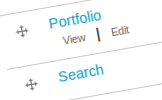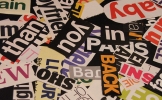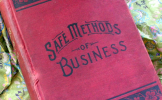Like most industries, those in the online marketing and SEO fields have a lingo of their own. At IndieMade, we live and breathe creative websites for artists, so forgive us if we speak a foreign language from time to time. SEO…ALT tag…linkbait…SERP. Huh?! What does all that mean?
.jpeg)
301/302 Redirects – When an existing URL changes because you've deleted or moved a page, a redirect takes you to a new web page. It's important to redirect properly so that links to your site are not lost or dead. "301" is a permanent redirect and "302" is a temporary redirect.
Affiliate Marketing – A marketing tactic that gives an "affiliate," or partner, compensation for driving direct traffic to a site. For example, IndieMade affiliates get 15% of all revenue from a new referred customer.

How To Build an Artist Website
Sign up for our newsletter and get the book How to Build an Artist Website for free!
Algorithm – (Algo for short) A mathematical formula that search engines use to rank and serve up results in search queries. Super secret and complex stuff!
ALT Text (Alternative Text or Alternative Attribute) – Search spiders can't "see" images, so this HTML text is applied to an image so web crawlers can "read" what the image is about. Use this on all of your product shots or site images.
Anchor Text – The text in a hyperlinked word or phrase that tells about the page content on where the link is pointing. Don't use "click here" as your anchor text; use relevant descriptors of what the page is about. Example: Learn how to create meaningful blog posts. Hint: Try to incorporate your keywords whenever possible.
Backlinks (inbound links) – Links from outside websites that link to pages on your site. The more "quality" links pointing to your site, the better it is for SEO.
Black Hat SEO – Trying to cheat the search engines by using unethical practices such as buying links, keyword stuffing, or tampering with a competitor's site or reputation.
Click Through – When someone clicks on a hyperlink and goes through to the intended destination. This can be on a website, newsletter, member sign-up — anything with a link.
Click Through Rate (CTR) – The percentage of people that saw your link and clicked through to the desired page. In web marketing, you always want a high CTR!
Content Marketing – Using quality content to increase traffic to your site through visibility and reach. Blogs, video, e-newsletters, site articles — content is anything that informs in response to a search query.
Conversion Rate – The percentage of your visitors that take the desired action on your site. This can be to buy a product, become a member, or read through to the second page of a story. Always know what you want a visitor to do, then measure how many of them did it. Conversion data tells you how successful your web marketing is.
Crawler –The program that a search engine uses to move and index pages on your site.
Domain – The main name of a website, such as IndieMade, that is owned, along with the domain suffix, such as .com, .org, etc.
Editorial Calendar – A "calendar" that plans content for your blog, newsletter, or site. Planning in advance helps you stay on track and keeps "writer's block" at bay!
Flash – Flash is a highly interactive technology that is often used for animation on a site. It looks great, but is hard for search engines to read because it isn't text. Use it in combination with HTML for better SEO results.
<h1> & <h2> Tags – These HTML codes tell search engines important parts of your content. <h1> is Headline/Heading 1 and <h2> is Headline/Heading 2.
HTML (Hypertext Markup Language) – This is the standard code used for all web pages. HTML defines the look of all parts of a page, such as color, font, and graphics. NOTE: "ML" anything for code stands for "markup language," which is what the search engines read.
Index– How many pages of a site a search engine can see and keep on file. A quick way to check is to go to a search engine and type: site:www.yourname.com. The number of results that come back signifies the number of pages indexed.
Keyword / Keyword Phrase– A word, or string of words, that is highly relevant to a product or service and you want search engines to rank you for — i.e. handmade silver jewelry. Finding the best keywords should be the first step in any web marketing campaign.
Keyword Stuffing – The "bad" practice of listing keywords over and over on a page in an effort to rank. A big "no-no" for SEO.
Landing Page / Destination Page– The web page where a link or paid ad takes a visitor on your site. Be highly targeted with and relevant to where your link points; don't just use your home page.
Linkbait – Something highly interesting on your site that others will link to. This could be a special offer, juicy news item, or free download, to name a few. Inbound links help SEO a lot.
Meta Data – Information the search engines read to understand more about your site. A meta description is pulled in search results and helps with CTR. Meta keywords used to be important, but don't help much with SEO anymore. They don't hurt you, so include them when you can.
NoFollow – Part of the code that tells search spiders NOT to follow the link and index the page it is pointing to. Most comments in social media are "NoFollow" so that spammers can't include linkbacks to their site.
Organic Search Listings – The non-paid listings that a search engine returns in result of a search query. Also called "natural" search listings.
PPC – Pay-Per-Click Advertising (PPC) applies to paid search listings in search results. If someone clicks on that link, the advertiser will pay. While less effective than SEO, PPC campaigns have advantages that are worth exploring.
ROI (Return On Investment) – Always be clear what the goal is and measure to be sure your efforts have paid off.
Reciprocal Link – The practice of sites deciding to link to each other just to link. These backlinks cancel each other out and have no impact with SEO results.
RSS (Really Simply Syndication) – A web feed used to bring you information such as news or blogs.
SEM (Search Engine Marketing) – The catch-all term for all digital marketing initiatives from SEO to PPC to social media and everything in between.
SEO (Search Engine Optimization) – Creating web pages that are desirable for search engines to read and people to easily find your relevant products and services.
SERP (Search Engine Results Page) – The page that the search engine serves up in response to a search query. You always want SERP #1!
SPAM – The word "spam" has become an all-inclusive, generic word for anything on the web that you don't want. It was originally coined to describe unethical practices of trying to twist search results for gain in SEO or sales.
Spider (crawler or robot) – A web program that moves through the Internet and your website to access your data and information.
Splash Page– A densely graphic page that has little text for search spiders to read.
Title Tag – The HTML <title> tag appears at the top of your page and is the first thing the search engines look at to understand what your page is about. If you do one thing for SEO, optimizing your title tag should be it!
URL (Uniform Resource Locator) – The address of a website or information on the web.
XML– Extensible Markup Language. An alternate form of data for search engines to read. Currently only a supplement to HTML which people and engines can read.



